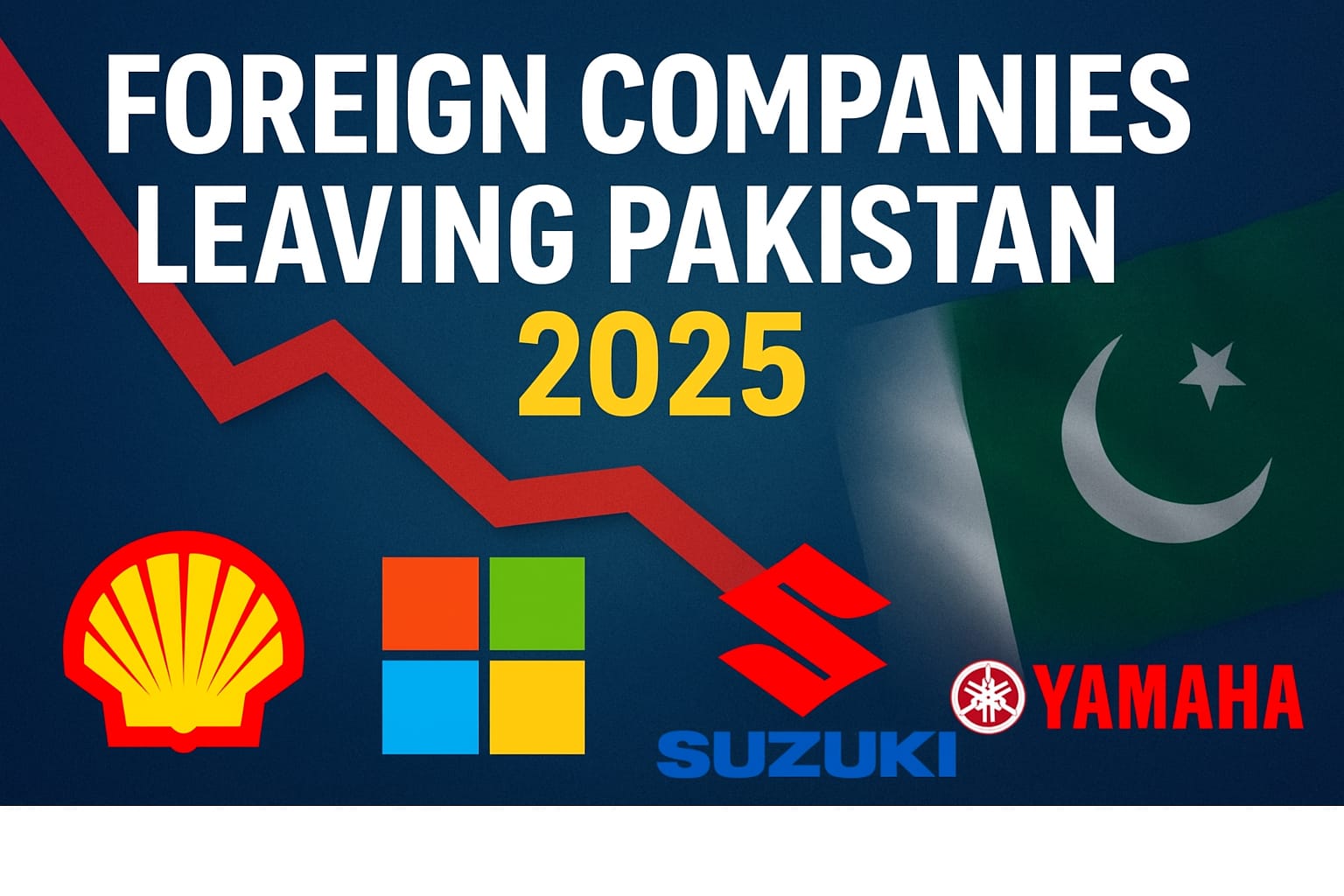Foreign Companies Exit Pakistan 2025: Shell, Suzuki, Yamaha, P&G, and Microsoft Scale Down Amid Economic Crisis
Shell, Suzuki, Yamaha, P&G, and Microsoft cut operations in Pakistan amid forex shortages, inflation, and unstable policies.
Raja Awais Ali
10/15/20253 min read
Foreign Companies Exit Pakistan: Economic Instability Deepens
Pakistan’s economy is facing a severe investment crisis, with multiple multinational companies either downsizing or exiting amid persistent inflation, foreign exchange shortages, and policy uncertainty.
Over the past two years, several major corporations — including Shell, Suzuki, Yamaha, Procter & Gamble (P&G), and Microsoft — have scaled back their presence, signaling deep-rooted challenges for the country’s business climate.
This wave of corporate exits has raised alarm bells for policymakers, investors, and economists alike.
Shell’s Departure: A Blow to Pakistan’s Energy Sector
Shell Pakistan Limited, a key player in the energy market for over seven decades, announced its decision to exit the country in 2023.
The company cited difficulties in repatriating profits, foreign exchange restrictions, and inconsistent policy frameworks as key reasons.
By mid-2024, Shell sold its 77% stake to Saudi Arabia’s Wafi Energy, officially transferring operational control.
Analysts described this as a symbolic setback, representing the departure of both foreign capital and international expertise from Pakistan’s energy sector.
Suzuki and Yamaha Struggle Amid Import Bans and Inflation
Suzuki Motor Corporation, one of Pakistan’s largest car manufacturers, has been repeatedly forced to halt production since 2023 due to import restrictions, dollar shortages, and rising costs.
Although limited production resumed in 2024, reduced consumer demand and supply chain issues have continued to pressure the company.
Suzuki executives have expressed concern over ongoing currency instability and inconsistent automotive policy — warning that sustained uncertainty could affect future investments.
Similarly, Yamaha Motor Pakistan has reduced production amid rising costs of imported parts and a depreciating rupee.
In 2024, output cuts and delayed product launches underscored the growing strain on the auto industry.
Industry observers say that unless reforms are implemented soon, Pakistan may witness further consolidation or downsizing in this sector.
Microsoft’s Exit: Tech Sector Feels the Impact
In mid-2025, Microsoft closed its local office in Pakistan after more than two decades of operation.
According to a company spokesperson, the move was part of a global restructuring and cost-optimization strategy, with Pakistan now shifting to a partner-led model managed through regional offices.
The closure affected a small team of local employees but symbolized a broader concern — global tech companies losing confidence in Pakistan’s market environment.
While the government clarified that Microsoft continues to serve local customers through regional partnerships, the absence of a direct office highlights declining multinational engagement in the country’s tech sector.
P&G and FMCG Sector Under Pressure
Procter & Gamble (P&G), a major player in Pakistan’s fast-moving consumer goods (FMCG) market, scaled down its operations in 2025.
The company cited rising raw material costs, high import duties, and unpredictable taxation as key challenges.
P&G has shifted production of certain product lines abroad, reducing its local manufacturing footprint.
This has impacted employment in related industries and added pressure on Pakistan’s already struggling consumer goods market.
Other international firms have also restructured or reduced their activities, as operational costs in Pakistan remain significantly higher than regional competitors.
Economic Experts Warn of Long-Term Impact
Economists warn that the ongoing withdrawal of multinational corporations could inflict long-term harm on Pakistan’s economy.
Reduced foreign direct investment (FDI), declining employment, and shrinking tax revenues are already visible outcomes.
The government’s Special Investment Facilitation Council (SIFC) has announced new reforms to attract investors, but experts argue that policy consistency, currency stability, and political calm are prerequisites for real progress.
If immediate corrective actions are not taken — especially in energy, automotive, technology, and FMCG sectors — Pakistan risks a prolonged industrial slowdown.
Conversely, restoring investor trust through transparent and predictable policies could eventually reverse this trend.
Conclusion: A Warning Sign for the Future
The downsizing and departure of leading global firms — Shell, Suzuki, Yamaha, P&G, and Microsoft — serve as a clear warning for Pakistan’s economic policymakers.
Without urgent reforms, the country may continue losing multinational investors, jeopardizing industrial growth, employment, and global competitiveness.
Pakistan’s economic revival now depends on stability, transparency, and investor-friendly policies that can rebuild confidence in its markets.


Stay informed with the latest national and international news.
© 2025. All rights reserved.